
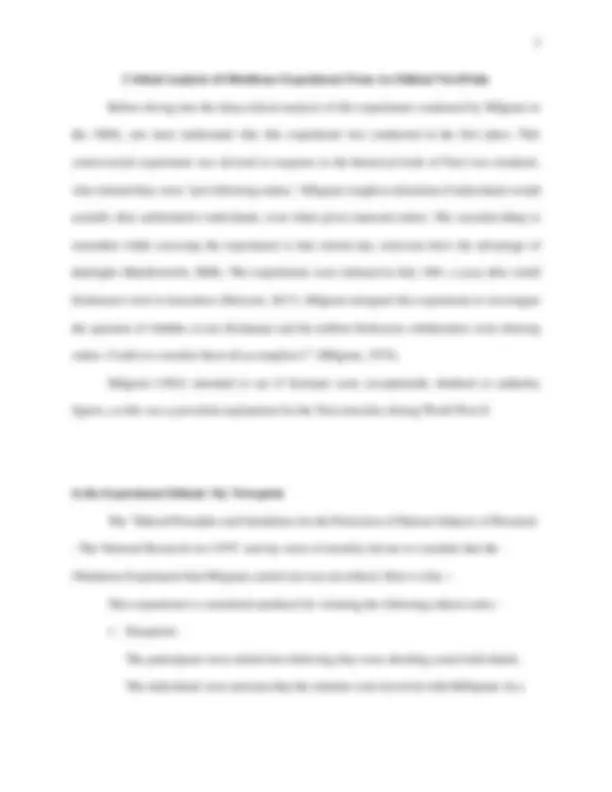
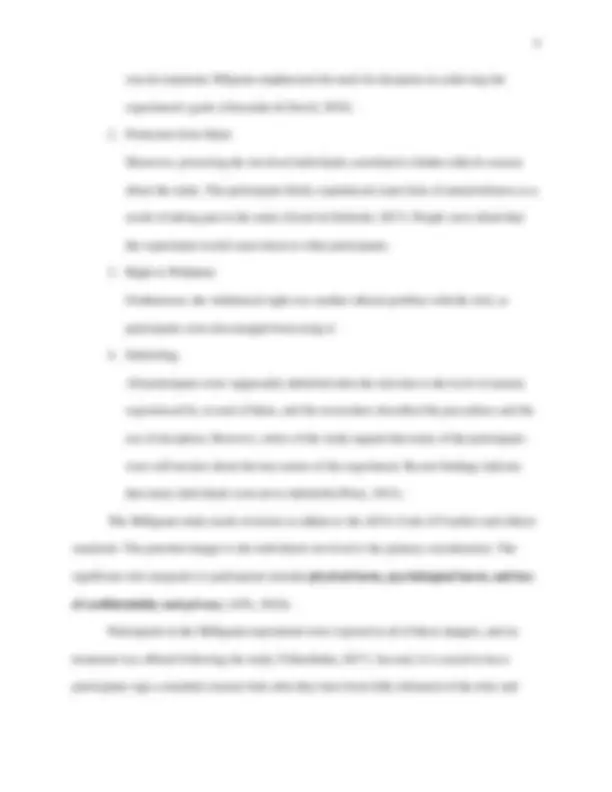
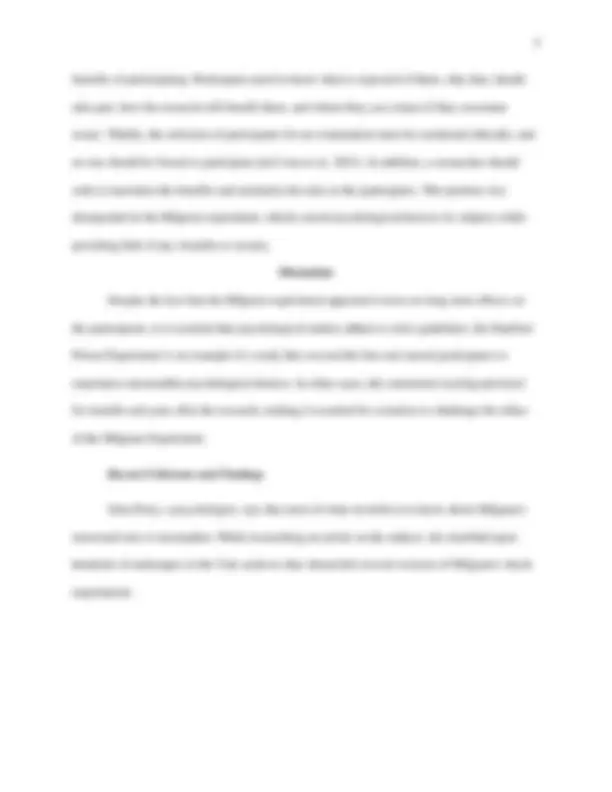
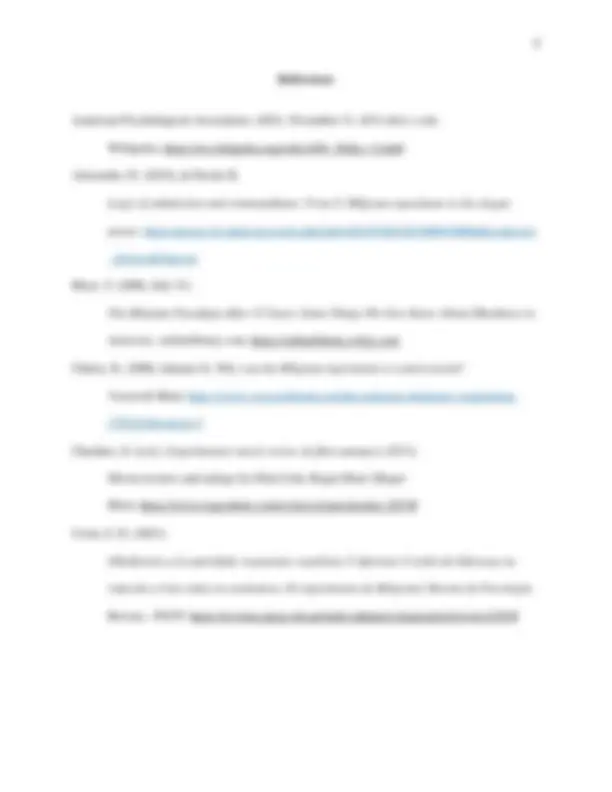
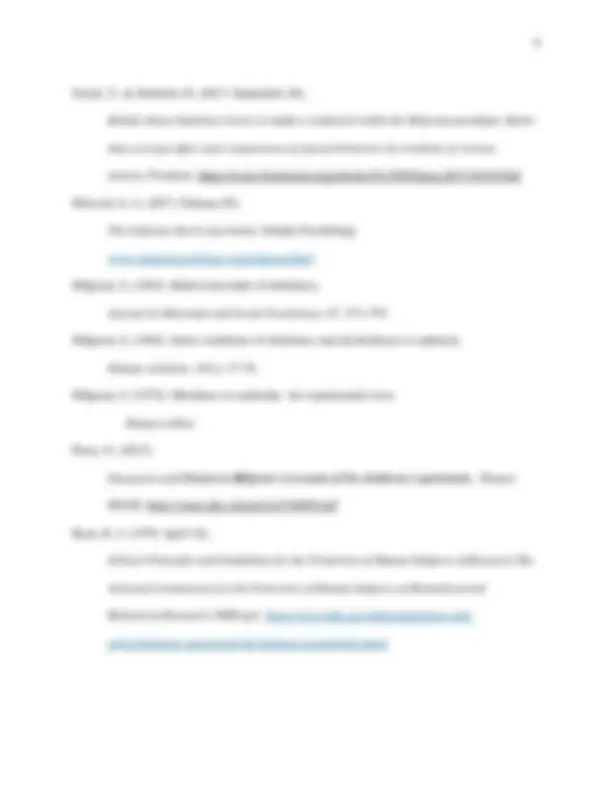
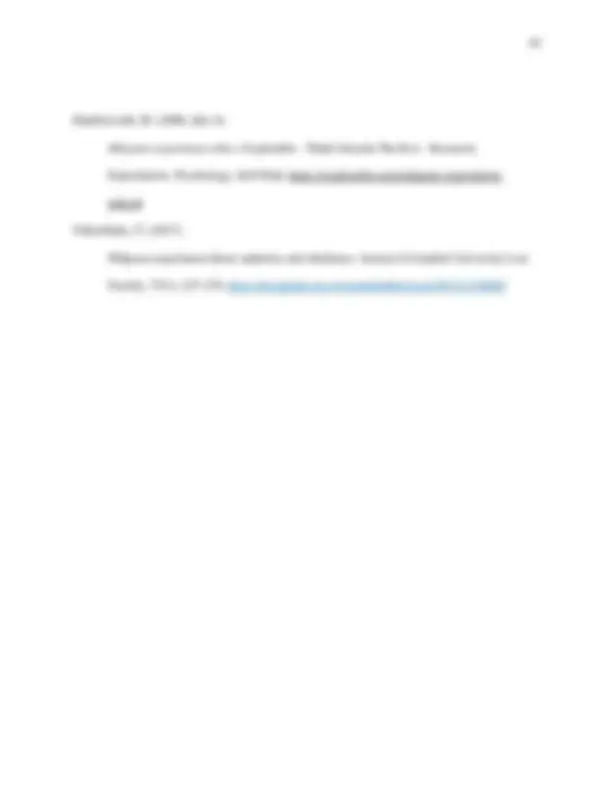


Study with the several resources on Docsity

Earn points by helping other students or get them with a premium plan


Prepare for your exams
Study with the several resources on Docsity

Earn points to download
Earn points by helping other students or get them with a premium plan
Community
Ask the community for help and clear up your study doubts
Discover the best universities in your country according to Docsity users
Free resources
Download our free guides on studying techniques, anxiety management strategies, and thesis advice from Docsity tutors
This document provides a brief analysis of the ethical viewpoint of Milgram's Disobedience Experiment, which was conducted in 1961. The analysis draws mainly from the movie "Experimenter" and is supplemented by information from various scientific research papers and articles.
Typology: Essays (university)
1 / 10

This page cannot be seen from the preview
Don't miss anything!







Experimenter: Critical Analysis Of Milgram Obedience Experiment From An Ethical ViewPoint Dhruv Mahajan PSYBSCA Amity Institute Of Behavioral & Applied Sciences, Amity University Mumbai – Maharashtra PSY2303: Research Methodolgy - I Professor Saumya Dhiman 15 th^ December 2022
About the Movie: Experimenter The most intellectually stimulating of recent American movies, "Experimenter," centres on Dr. Stanley Milgram (Peter Sarsgaard), the man behind several enduringly well-known social psychology studies, to whom the movie introduces us. In 1961, Milgram observed from behind a two-way mirror; as a colleague (John Palladino) leads two men into a room and describes the experiment in which they have consented to take part. One guy will attempt to memorise exam answers and go under the name of "Learner." When the Learner (who is out of sight) responds incorrectly, the second guy, the "Teacher," will keep track of his responses and administer a series of more powerful electric shocks to him (Cheshire, 2015). Here, this experiment is a deception. In reality, the Learner is not experiencing the shocks; instead, he is acting out the experience by playing audiotapes of his voice, yelling, and complaining as the shocks ostensibly become stronger. The teacher is the one being who is actually being evaluated. How much longer will he shock a total stranger despite their pleadings for him to stop? An overwhelming majority of respondents claim they would halt long before the shocks intensified to their highest level. However, in Milgram's initial tests and subsequent replications of them, about a 65percent of the participants continued administering shocks all the way through, whereas only a 35percent did so earlier.
crucial statement, Milgram emphasized the need for deception in achieving the experiment's goals (Alexandre & David, 2018).
benefits of participating. Participants need to know what is expected of them, why they should take part, how the research will benefit them, and whom they can contact if they encounter issues. Thirdly, the selection of participants for an examination must be conducted ethically, and no one should be forced to participate (da Costa et al., 2021). In addition, a researcher should seek to maximize the benefits and minimize the risks to the participants. This premise was disregarded in the Milgram experiment, which caused psychological harm to its subjects while providing little if any, benefits to society. Discussion Despite the fact that the Milgram experiment appeared to have no long-term effects on the participants, it is essential that psychological studies adhere to strict guidelines; the Stanford Prison Experiment is an example of a study that crossed the line and caused participants to experience measurable psychological distress. In other cases, this emotional scarring persisted for months and years after the research, making it essential for scientists to challenge the ethics of the Milgram Experiment. Recent Criticisms and Findings Gina Perry, a psychologist, says that most of what we believe to know about Milgram's renowned tests is incomplete. While researching an article on the subject, she stumbled upon hundreds of audiotapes in the Yale archives that chronicled several versions of Milgram's shock experiments.
Variations resulted in differing outcomes Another issue is that the version of the research offered by Milgram and the one most frequently repeated are incomplete. The claim that 65 percent of respondents following directions only related to one variant of the experiment, in which 26 out of 40 subjects followed the instruction. However, in other variations, much fewer subjects were willing to comply with the experimenters' instructions, and in certain variations of the research, not a single subject did so. A review of Milgram's research materials reveals that the tests were more forceful than the first findings indicated. Obedience was shown to be significantly lower in alternate versions of the experiment, and many participants adjusted their conduct after correctly guessing the experiment's objectives (Blass, 2006). Conclusion In conclusion, despite the undeniable fact that the experiment in its original form would not be allowed, it is essential to remember that Stanley Milgram was not a wrong person. At the time, the ethics of the Milgram experiment appeared plausible. Milgram's generation needed conclusive information on the "ultimate solution" and a conclusion to this chapter of human history. Was human nature fundamentally flawed, or could sensible individuals be coerced by the authority to engage in unnatural behaviors?
References American Psychological Association. (2021, November 5). APA ethics code. Wikipedia. https://en.wikipedia.org/wiki/APA_Ethics_Code# Alexandre, D. (2018), & David, B. Logic of submission and commandment: From S. Milgram experiment to the slogan power. https://pepsic.bvsalud.org/scielo.php?pid=S010356652018000100004&script=sci _abstract&tlng=en Blass, T. (2006, July 31). The Milgram Paradigm After 35 Years: Some Things We Now Know About Obedience to Authority. onlinelibrary.com. https://onlinelibrary.wiley.com Cherry, K. (2008, January 6). Why was the Milgram experiment so controversial? Verywell Mind. https://www.verywellmind.com/the-milgram-obedience-experiment- 2795243#citation- 5 Cheshire, G. (n.d.). Experimenter movie review & film summary (2015). Movie reviews and ratings by Film Critic Roger Ebert | Roger Ebert. https://www.rogerebert.com/reviews/experimenter-2015# Costa, S. D. (2021). Obediencia a la autoridad, respuestas cognitivas Y afectivas Y estilo de liderazgo en relación a Una orden no normativa: El experimento de Milgram | Revista de Psicología. Revista - PUCP. https://revistas.pucp.edu.pe/index.php/psicologia/article/view/
Shuttleworth, M. (2008, July 4). Milgram experiment ethics. Explorable - Think Outside The Box - Research, Experiments, Psychology, Self-Help. https://explorable.com/milgram-experiment- ethics# Yükselbaba, Ü. (2017). Milgram experiment about authority and obedience. Journal of Istanbul University Law Faculty, 75(1), 227-270. https://dergipark.org.tr/en/pub/iuhfm/issue/30512/